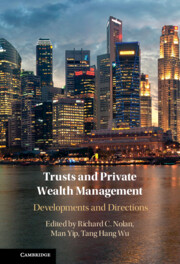Book contents
- Trusts and Private Wealth Management
- Trusts and Private Wealth Management
- Copyright page
- Contents
- Contributors
- Table of Cases
- Table of Legislation
- 1 Introduction
- 2 Family Trusts Today
- Part I The Rise of Asian Wealth
- 3 Asian Wealth in the United States
- 4 Regulation of Residential Property in the West
- 5 An Asian Approach to Mental Capacity for Wills and Lasting Powers
- 6 Testamentary Freedom and Inheritance Disputes in Hong Kong
- 7 Crazy Rich Families in Singapore
- 8 Family Offices, Private Trust Companies, and Trust Integrity Issues
- Part II The Changing Legal Context
- Index
5 - An Asian Approach to Mental Capacity for Wills and Lasting Powers
from Part I - The Rise of Asian Wealth
Published online by Cambridge University Press: 08 December 2022
- Trusts and Private Wealth Management
- Trusts and Private Wealth Management
- Copyright page
- Contents
- Contributors
- Table of Cases
- Table of Legislation
- 1 Introduction
- 2 Family Trusts Today
- Part I The Rise of Asian Wealth
- 3 Asian Wealth in the United States
- 4 Regulation of Residential Property in the West
- 5 An Asian Approach to Mental Capacity for Wills and Lasting Powers
- 6 Testamentary Freedom and Inheritance Disputes in Hong Kong
- 7 Crazy Rich Families in Singapore
- 8 Family Offices, Private Trust Companies, and Trust Integrity Issues
- Part II The Changing Legal Context
- Index
Summary
The current capacity tests in Hong Kong and Singapore for executing wills (including will substitutes) and appointing proxy decision-makers are derived from England. Due to an increasing rate of dementia and rapidly changing family dynamics, it has become particularly challenging to apply these tests in all these jurisdictions. Thus far, English judges who apply these tests have sought to give maximum scope to individual autonomy. For example, the courts have downplayed the requirement that the will be ‘rational on its face’. Outcome-based considerations such as whether a disposition meets the expectation of the deceased’s natural heirs are relevant only to demonstrate coherence of the decision-making process. However, there has been surprising little discussion as to whether judges in Hong Kong and Singapore adopt the same approach in applying these tests. This chapter examines relevant judicial decisions in these two jurisdictions and argues that whilst judges in Hong Kong tend to follow the English approach closely, judges in Singapore are more willing to take into account the values of family protection and concerns of improper influence in assessing capacity for testamentary and lifetime dispositions. The analysis concludes by proposing a legitimate role that family values may play in assessing testamentary capacity.
- Type
- Chapter
- Information
- Trusts and Private Wealth ManagementDevelopments and Directions, pp. 69 - 88Publisher: Cambridge University PressPrint publication year: 2022

